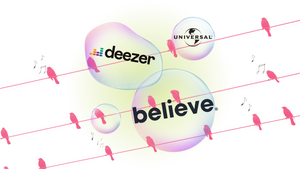Artist and label services company Believe has responded to the announcement last week that Deezer will change the way it allocates revenues to tracks later this year, initially in France, adopting what it has dubbed an "artist-centric" model.
Believe - which also owns DIY distributor TuneCore - welcomes Deezer's plan to remove third-party functional audio from its platform and its commitments to further ramp up its efforts to combat streaming fraud. However, perhaps unsurprisingly, it is not so keen on the decision to treat plays from 'professional artists' differently to those by 'non-professional artists'.
Deezer's grand plan was informed by a research partnership it entered into with Universal Music. That followed an internal memo from Universal boss Lucian Grainge at the start of the year in which he declared that "the economic model for streaming needs to evolve".
One of Grainge's gripes related to “functional audio” such as white noise and bird song. When it comes to the allocation of streaming revenue, this content is treated the same as anything else, meaning that a white noise track can earn at the same rate as a track from a Universal Music-signed artist.
Because that content plays a functional role - for example facilitating sleep or relaxation - some people play it a lot, which means that a significant chunk of streaming money each month flows to the people uploading that sort of audio to streaming services.
Under the new system, Deezer will make its own functional audio which will replace third-party content of that type. The streaming firm then won't take any money out of the royalty pool when it is played. That plan has been welcomed by some in the music community - though this is partly dependent on quite how 'functional audio' is defined.
The more divisive part of Deezer’s strategy is the plan to provide a 'double boost' to 'professional artists'. This basically means that their plays will count twice for allocation purposes.
To qualify as a 'professional artist', a music-maker needs to get at least 1000 streams from at least 500 unique users each month. Artists who fall below that threshold - some of them hobbyist musicians, but some of them self-releasing artists at an early stage in their career - will get a lower average per-stream payout under the new system.
In a statement yesterday, Believe took aim at that latter proposal, saying: “As a company working with artists and labels at all levels Believe considers that all artists shall be compensated equally by streaming services regardless of their stage of development".
“We strongly oppose an unfair ‘reverse Robin Hood’ system that is centred around taking compensation from rising artists to allocate it to top and established artists", it went on. “Further, it is our belief, based on data, that such a system would reduce diversity and discourage creativity".
Many in the wider music community are also concerned that Deezer is seemingly making these changes without more widely consulting labels and artists. Indeed, it's not clear that any artists have been consulted at all about the 'artist-centric' model that Deezer and Universal have decided to adopt.
Many artists and independents have been calling for changes to the track allocation system for years. However, that doesn’t mean that those artists want the biggest music rights company in the world to unilaterally make major decisions about what the best model might be - particularly when those decisions are dubbed ‘artist-centric’ but only serve the interests of some artists.
Alluding to those concerns, Believe boss Denis Ladegaillerie stated yesterday: “Right now, the debate about ‘value-sharing’ does not exist. Instead, we are experiencing commercial negotiations to lower the market share of all independent artists. We do not think it is right to trade less diversity for better economics, nor for top artists to take away revenue from emerging acts".
With all that in mind, Believe said it would continue to work with the streaming services and the music industry at large to "explore the best foundation to build an equitable new streaming model for all artists”.

